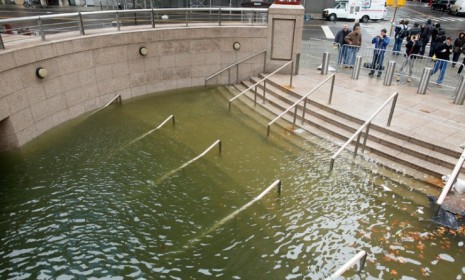Obama's second term: The case for new climate change laws
Hurricane Sandy brought a politically risky, backburner issue to the forefront of campaign 2012's final days. What now?

A free daily email with the biggest news stories of the day – and the best features from TheWeek.com
You are now subscribed
Your newsletter sign-up was successful
Republicans love to mock President Obama for vowing in his 2008 presidential nomination acceptance speech to help bring about "the moment when the rise of the oceans began to slow and our planet began to heal." But a few weeks ago, the oceans rose in spectacular fashion, flooding New York City and washing away part of the Jersey Shore. The destruction of Hurricane Sandy, and Obama's reaction to it, moved New York Mayor Michael Bloomberg to come off the sidelines to endorse Obama, citing the president's belief in the need to combat climate change and his opponent Mitt Romney's latter-day denial. "Climate is back on the agenda, and I think Bloomberg especially is going to hold the president to some sort of action," says Andrew Holland at the American Security Project.
The issue: Climate change
Climate scientists agree that emissions from vehicles, power-generation plants, and other sources of greenhouse gases are building up in the atmosphere and raising the temperature on Earth, with a whole host of unpleasant and unpredictable results. At the same time, the number of Americans who are concerned about man-made global warming is smaller than two decades ago.
The Week
Escape your echo chamber. Get the facts behind the news, plus analysis from multiple perspectives.

Sign up for The Week's Free Newsletters
From our morning news briefing to a weekly Good News Newsletter, get the best of The Week delivered directly to your inbox.
From our morning news briefing to a weekly Good News Newsletter, get the best of The Week delivered directly to your inbox.
At Obama's urging, the House passed a bill to set up a cap-and-trade system to curb greenhouse gas emissions in 2009, but it died in the Senate, and Republican gains in the 2010 midterms ended any prospects of a sweeping climate change law in his first term. Instead, Obama enacted new fuel standards for automobiles, up to 54.5 miles per gallon for the 2025 model year, from 27.6 mpg in 2011, with support from 13 automakers, and took steps to cut down on pollution from coal-fired power plants.
"We want our children to live in an America that isn't burdened by debt, that isn't weakened by inequality, that isn't threatened by the destructive power of a warming planet," Obama said in his victory speech on Election Night.
What Obama might accomplish
Hurricane Sandy has made climate change a real, visceral political issue, and "the impact on wealthier suburban communities has created more political support for addressing an issue that was largely ignored throughout the 2012 campaign," says Julian Zelizer at CNN. And despite the continuing opposition of Republicans and coal-state Democrats, says former EPA administrator Christine Todd Whitman in The New York Times, federal cap-and-trade proposals are a solution that "should stay on the table." Hopefully "my Republican colleagues will see the wisdom of a market-based system for funding a public good — all very much Republican principles."
A free daily email with the biggest news stories of the day – and the best features from TheWeek.com
Or, "instead of revising that complex scheme, how about a straightforward carbon tax?" says Michael Tomasky at The Daily Beast. Whereas cap-and-trade involves creating markets for carbon credits, the carbon tax is a tax. "Everyone can understand it," there are lots of ways to implement it, and expert say it could do a lot to lower carbon emissions. You could even use some of the revenue from taxing emissions to pay down the deficit, "which could broaden bipartisan appeal." Bloomberg could help move moderates, and ExxonMobil CEO Rex Tillerson and conservative economist Greg Mankiw might even bring some Republicans across the finish line. The GOP would be "have a pretty hard time accusing the CEO of ExxonMobil of being some kind of socialist."
Why new legislation is unlikely
A carbon tax would help lower CO2 emissions and raise some $144 billion by 2020, but let's face it, says Scott Segal at the lobbying firm Bracewell & Giuliani: Republicans won't support anything that has the word "tax" in it.
So what can we realistically expect on the climate change front from Obama' second term? "Simply put: more of the same," says David Biello at Scientific American. GOP control of the House makes big legislation like a carbon tax unlikely, but Obama's record of taking action through executive action and working directly with the private sector is no small thing. "Obama's second term may not slow the rise of the oceans or begin the healing of the planet," Biello says, "but it will give the two-term president a chance to secure his legacy as one of the greenest chief executives in U.S. history."
"It will be painfully easy to tell if President Obama is going to take a serious stab at doing something about climate change in his second term," says Bill McKibben in The Washington Post: Watch to see if he approves the Keystone XL pipeline from Canada. "That pipeline, if built, will carry the same amount of oil saved by his auto mileage standards," meaning in one fell swoop "his second term canceled out the one best things done in his first."
Read more analysis of Obama's second term:
-The case for immigration reform
-The case for intervening in Syria
Sources: CNN, Daily Beast, New York Times, Reuters (2), PolitiFact, Scientific American, ThinkProgress, Washington Post